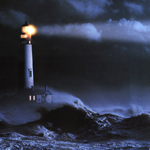|
|
 |
Dusted Reviews
Artist: John Maus Album: We Must Become the Pitiless Censors of Ourselves Label: Ribbon Review date: Jul. 21, 2011 |

|
|
|
 |
The drum may be at the root of all popular music, and the guitar in rock ‘n’ roll its greatest proselytizer, but the synthesizer provides the best shortcut to signaling what is meant to be a pop song. By definition, “to synthesize” means “to form (a material or abstract entity) by combining parts or elements.” Something synthetic is “formed through a process by human agency, as opposed to those of natural origin.” Such processes are at the heart of pop, which aims to construct a kind of artificial, momentary group experience. Ultimately, this requires a certain amount of manipulation of the listener, and what better way to do that than with the most manipulative instrument around.
A synthesizer can sound like anything, and as a result often sounds like everything. Ironically, this is the major recurring problem with John Maus on We Must Become the Pitiless Censors of Ourselves. Maus uses the exploratory work from 2006’s Songs and 2007’s transitional Love is Real to develop his own voice, his own approach to such synthetic music. In doing so, however—this is where the irony comes in—he sacrifices most of his originality to referential tropes. Through successfully emulating noteworthy keyboardists of the past, he nearly obliterates his own identity as a practitioner.
It’s not that he isn’t good, either. He’s too good. Take “Streetlight,” which does baroque arpeggiation that would make any classicist pause (fun fact: Maus shares a birthday with Handel). The skill and dexterity is undeniable, but to what end? The same issue rears its head with “Quantum Leap,” except on the opposite end of the spectrum. This time around, it’s Joy Division that’s getting reanimated, specifically those early Warsaw moments that skip and stutter with both mania and lack of skill. Those imperfections are replicated, which, again, is a notable feat, but only in the way that leads to the detection of most plagiarists. It’s too precise a copy, and when faced with that uncanny likeness, it’s difficult not to reject it on principle.
Generally speaking, once the urge of playing this involuntary game of sound memory kicks in on any given song, it’s hard to be fair: LCD Soundsystem did “Head for the Country” better on “One Touch,” “Matter of Fact” should have been passed along to Mike Sniper, and “Keep Pushing On” pushes that shimmering ’80s synthesizer run completely over the cheese border.
There is a flip side to that, though. When Maus avoids the pitfalls of blatant referentiality, when his own ideas and his own interpretation of what a synthesizer can sound like prevails, it makes for dreamy instances of near-bliss. “Hey Moon” invokes a calming sense of familiarity even while stacking up vocals, barely-there drum machine hits, and a worn-in synth line in an inspired combination. And there’s a certified anomaly, “We Can Breakthrough.” Rather than focus on form or historicity, Maus lets the different elements run free as he adds and subtracts on the fly. The song never really congeals; it’s the only real instance where synthesis fails on the album. And it’s where his voice can be heard most clearly.
By Evan Hanlon
|







